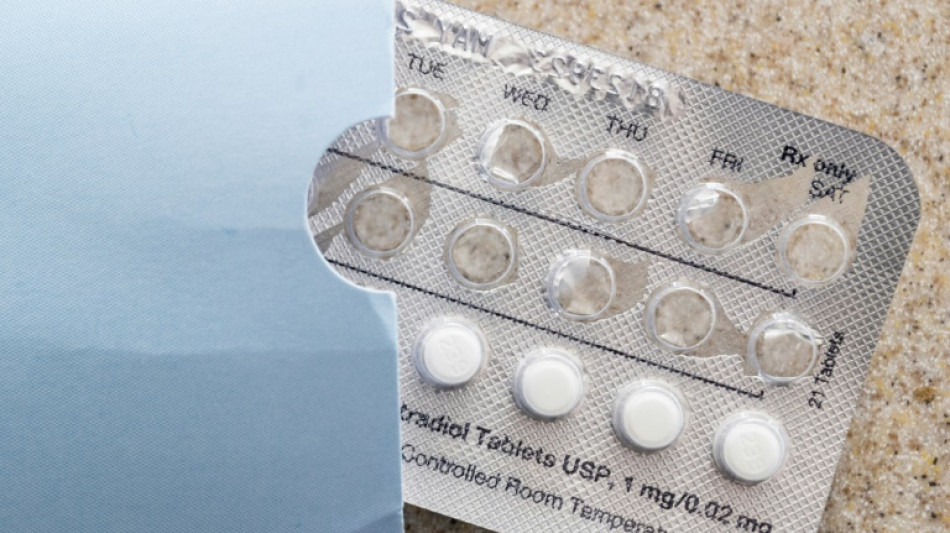
-
 Five things to know about Uganda
Five things to know about Uganda
-
Uganda votes under internet blackout and police crackdown

-
 Dreams on hold for Rohingya children in Bangladesh camps
Dreams on hold for Rohingya children in Bangladesh camps
-
Canada's Carney in Beijing for trade talks with Chinese leaders

-
 All Blacks fire coach Robertson less than two years before World Cup
All Blacks fire coach Robertson less than two years before World Cup
-
Long-awaited EU-Mercosur trade pact set for signing

-
 Trump embraces AI deepfakes in political messaging
Trump embraces AI deepfakes in political messaging
-
A year of Trump: US health policy reshaped in RFK Jr's image

-
 One year in, Trump shattering global order
One year in, Trump shattering global order
-
Hit TV show 'Heated Rivalry' a welcome surprise for gay hockey community

-
 Spanish singer Julio Iglesias prepares defence against abuse allegations: Hola! magazine
Spanish singer Julio Iglesias prepares defence against abuse allegations: Hola! magazine
-
Actor McConaughey seeks to patent image to protect from AI

-
 Musk's Grok barred from undressing images after global backlash
Musk's Grok barred from undressing images after global backlash
-
Hosts Morocco set up Senegal AFCON final showdown

-
 Trump says Iran killings stopped, Tehran says 'no plan for hanging'
Trump says Iran killings stopped, Tehran says 'no plan for hanging'
-
Chelsea paid for costly errors in Arsenal defeat, says Rosenior

-
 Morocco beat Nigeria on penalties to reach Africa Cup of Nations final
Morocco beat Nigeria on penalties to reach Africa Cup of Nations final
-
Golden Globes viewership shrinks again

-
 Astronauts leave ISS in first-ever medical evacuation
Astronauts leave ISS in first-ever medical evacuation
-
NASA reports record heat but omits reference to climate change

-
 Trump praises 'terrific' new Venezuela leader after call
Trump praises 'terrific' new Venezuela leader after call
-
Real Madrid crash out of Copa del Rey at Albacete on Arbeloa debut

-
 Trump says Iran killings stopped as US scales back Qatar base
Trump says Iran killings stopped as US scales back Qatar base
-
Arsenal beat Rosenior's Chelsea in League Cup semi first leg

-
 US stocks fall again as Iran worries lift oil prices
US stocks fall again as Iran worries lift oil prices
-
Inter extend Serie A lead to six points after Napoli slip

-
 Bayern beat Cologne to move 11 points clear in Bundesliga
Bayern beat Cologne to move 11 points clear in Bundesliga
-
Mane takes Senegal past Egypt into final of his last AFCON

-
 Trump says Greenland will 'work out' after Denmark fails to bridge gap
Trump says Greenland will 'work out' after Denmark fails to bridge gap
-
'Bridgerton' premieres in Paris promising 'Cinderella with a twist'

-
 California begins probe of Musk's Grok over sexualized AI images
California begins probe of Musk's Grok over sexualized AI images
-
Astronauts set to leave ISS in first-ever medical evacuation

-
 Napoli's stalemate with Parma opens door for Serie A leaders Inter
Napoli's stalemate with Parma opens door for Serie A leaders Inter
-
Syrian leader urges Kurdish integration as army sends troops east of Aleppo

-
 Denmark says White House talks failed to alter US designs on Greenland
Denmark says White House talks failed to alter US designs on Greenland
-
Venezuela looking to 'new era' after Maduro ouster, says interim leader

-
 Mane takes dominant Senegal past Egypt into AFCON final
Mane takes dominant Senegal past Egypt into AFCON final
-
UK police admit 'mistakes' over Maccabi Tel Aviv fan ban

-
 Promoter says Joshua will return to ring when 'time is right' after horror crash
Promoter says Joshua will return to ring when 'time is right' after horror crash
-
California investigating Grok AI over lewd fake images

-
 Wales's Faletau set to miss bulk of Six Nations
Wales's Faletau set to miss bulk of Six Nations
-
Denmark, Greenland wrap up crunch White House talks

-
 England sweating on Fin Smith's fitness for Six Nations opener
England sweating on Fin Smith's fitness for Six Nations opener
-
NASA acknowledges record heat but avoids referencing climate change

-
 England rugby league coach Wane quits role
England rugby league coach Wane quits role
-
Oil prices extend gains on Iran worries

-
 European basketball pioneer Schrempf lauds 'global' NBA
European basketball pioneer Schrempf lauds 'global' NBA
-
Denmark, Greenland in crunch White House talks as Trump ups pressure

-
 Mitchell hits ton as New Zealand down India to level ODI series
Mitchell hits ton as New Zealand down India to level ODI series
-
Syrian army tells civilians to stay away from Kurdish positions east of Aleppo


All hormonal contraceptives increase breast cancer risk: study
All hormonal contraceptives carry a slightly increased risk of breast cancer, including the increasingly popular progestogen-only pills, according to a study published on Tuesday.
The researchers who carried out the study stressed that the increased risk of breast cancer needs to be weighed against the benefits of hormonal contraceptives, including the protection they provide against other forms of female cancer.
Previous studies have established an increased risk of breast cancer from two-hormone, or combined, contraceptives that use both estrogen and progestogen.
While the use of progestogen-only contraceptives has been on the rise for well over a decade, little research had been performed previously on their links to breast cancer.
The study, published in the journal PLOS Medicine, found that the risk of a woman developing breast cancer was about the same for hormonal contraceptives using both estrogen and progestogen as for those using just progestogen.
According to the study, women taking hormonal contraceptives have a 20 to 30 percent higher risk of developing breast cancer than those who do not use them.
The findings are similar to those published previously, including in a vast 1996 study.
The risk remains about the same regardless of the delivery method -- oral pill, IUD, implant or injection -- or whether it is a combined pill or progestogen alone.
Taking into account that the likelihood of breast cancer increases with age, the authors of the study calculated how much absolute excess risk is associated with hormonal contraceptives.
For women taking hormonal contraceptives for a period of five years between the ages of 16 to 20, it represented eight cases of breast cancer per 100,000, they said.
Between 35 and 39 years old, it was 265 cases per 100,000.
- 'Very small increase in absolute risk' -
"Nobody wants to hear that something that they're taking is going to increase their risk of breast cancer by 25 percent," said Gillian Reeves, a professor of statistical epidemiology at the University of Oxford and a co-author of the study.
"What we're talking about here is very small increase in absolute risk," Reeves said.
"These increases in risk for breast cancer have to, of course, be viewed in the context of what we know about the many benefits of taking hormonal contraceptives," she added.
"Not just in terms of birth control, but also because we know that oral contraceptives actually provide quite substantial and long term protection from other female cancers, such as ovarian cancer and endometrial cancer."
The study also confirmed, like others, that the risk of breast cancer declines in the years after a woman stops using hormonal contraceptives.
Stephen Duffy, a professor at Queen Mary University of London who did not take part in the study, described the findings as "reassuring in that the effect is modest."
The study involved data from nearly 10,000 women under the age of 50 who developed breast cancer between 1996 and 2017 in the United Kingdom, where the use of progestogen-only contraceptives is now as widespread as the combined method.
Reeves said there were several explanations for the growing use of progestogen-only contraceptives.
They are recommended for women who are breast-feeding, who may be at risk of cardiovascular problems or smokers above the age of 35.
"It might just be because women are taking hormonal contraceptives possibly into later years now," Reeves said.
"So they are naturally at higher risk of those other conditions for which risk is increased with combined contraceptives."
S.Abdullah--SF-PST

